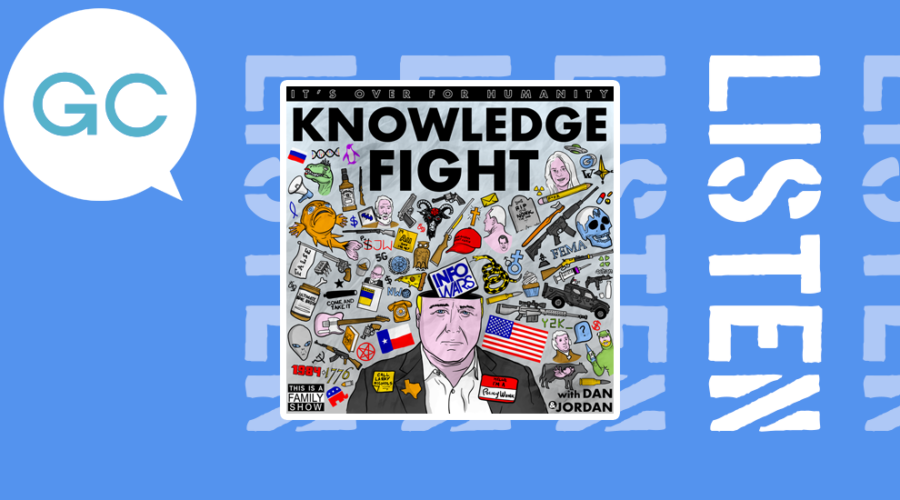With its 1000th episode rapidly approaching, this is the perfect time for a nod to the genius and vitality of American podcast Knowledge Fight.
In an era where conspiracy theories and misinformation run rampant, two self-deprecating heroes emerged from Chicago’s comedy scene: Dan Friesen and Jordan Holmes. Their podcast Knowledge Fight, which began in 2017, has shown itself to be a crucial resource for understanding and combatting conspiracy theories, particularly those propagated by InfoWars host Alex Jones.
But if that sounds worthy and hard work, trust me, it’s not. As they say on their website, “We know, we know… it sounds horrible and unlistenable, but we promise, we make it funny.”
While Dan researches the hell out of every word out of Jones’s mouth, Jordan keeps things funny, providing light relief with outraged shrieks and counter-arguments to Jonesian, Trumpian, Muskian and far-right nonsense.
Dan wanted to make the podcast because he wanted to counter Jones’s rhetoric. Jordan just wanted an excuse to spend more time with his bestie. And the format works.
I resisted listening when I first heard about it, because the episodes are long and I already subscribe to far too many podcasts. But so many friends raved about it that I had to give it a go. And for a couple of years now, I’ve been completely hooked.
The origins of Knowledge Fight
What started as a project between two friends, who met when they were on the Chicago stand-up circuit, quickly transformed into something much more significant. Well, maybe not quickly; earlier episodes hint at some mild frustration that they are working so hard with few listeners to show for it.
Over time, though, that has changed dramatically.
Dan Friesen, a meticulous researcher of Jones and conspiracies, and Jordan Holmes, providing comic relief and a voice for the audience’s disbelief, began analysing Alex Jones’s InfoWars broadcasts, episode by episode.
The format is simple: Dan listens to hours of InfoWars content, takes detailed notes, and presents his findings to Jordan, who hears it during the recording for the first time.
The pair attracted a devoted community of listeners who wanted to understand the mechanics of conspiracy theories and misinformation, while being entertained.
More than just comedy
While the show maintains its comedic elements, Knowledge Fight has become known for its rigorous fact-checking and historical documentation.
Dan’s approach involves not just debunking Jones’s claims, but tracing their origins, understanding their evolution, and documenting their impact on public discourse; this is incredibly important work.
Sometimes they look at current episodes, other times they dive back into Jones’s earlier career. What they have created is a comprehensive archive – and critique – of some of the messaging that helped to lead America to elect a leader like Trump.
The Alex Jones trial
The podcast’s reputation for detailed research paid off in 2022 when Dan Friesen found himself involved in the defamation trials that ultimatedly ended with Jones owing the families he was found to have defamed over $1 billion.
Having accumulated thousands of hours of research on Jones and InfoWars, Dan became an invaluable resource for the legal teams representing the Sandy Hook families.
Mark Bankston, one of the attorneys representing the families, has credited Knowledge Fight for providing crucial background information that helped shape their legal strategy; the podcast’s archive had become a searchable database of Jones’s statements, contradictions, and business practices.
During the trials, Dan’s presence in the courtroom added another layer to the podcast’s coverage. Their expertise was sought out by mainstream media outlets, and the podcast provided unique insight into the proceedings that other news sources couldn’t match.
Building a community
The show’s success isn’t just about its content – it’s about the community it has built.
Listeners, who call themselves – amongst other things – Policy Wonks and Technocrats (references to Jones’s pet hates) have created a vibrant online community dedicated to understanding and combating misinformation. When Friesen and Holmes do live shows, they sell out quickly and although the pair tend to eschew social media themselves, much discussion of the show can be found online.
The infamy of the Sandy Hook trials, and Knowledge Fight’s coverage, brought in new listeners who stayed for the blend of humour, research, and social commentary.
Knowledge Fight has helped demystify how conspiracy theories work and spread, clarifying precisely how these messages are shared, what makes them effective, and how we can resist and counter them, ultimately – hopefully – making it harder for bad actors to get away with exploiting public fears and uncertainties.
Looking forward
Even Friesen himself was a bit spooked in episode 999 about the magnitude of being about to drop a 1000th episode, a milestone few podcasts reach. The mental health of both hosts has varied over the years they’ve been making the show, and concentrating on such intensely depressing and frightening subject matter is clearly not always easy for them.
But as misinformation continues to shape public discourse, Knowledge Fight and its archives remain a vital resource. The show has expanded its scope beyond just Alex Jones, examining other conspiracy theorists and far-right figures and tracking patterns in misinformation networks.
Dan and Jordan’s work has shown that combating misinformation requires more than just fact-checking – the narratives, techniques, and emotional appeals that make conspiracy theories compelling to believers need to be understood, too.
What began as two friends discussing a conspiracy theorist that one of them was mildly obsessed with has become an important part of the larger conversation about truth, media literacy, and the future of public discourse. And with the second Trump presidency now in place, this is more important than ever.
Through Knowledge Fight, we can see that, sometimes, the best way to fight misinformation is with a spicy combination of research, context and humour.

